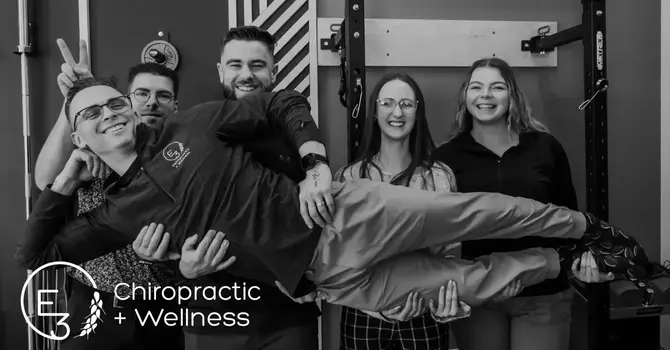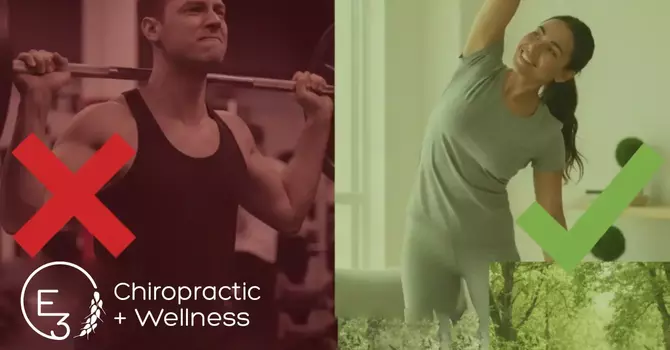
If you’ve ever felt stiff, achy, or sore after a workout—or even after sitting at your desk all day—you might be quick to blame your posture, your training program, or even “getting older.” But what if one of the most overlooked factors contributing to your pain and slow recovery was something as simple as hydration?
Most people think of water intake as important only for energy or performance at the gym. In reality, hydration has a direct impact on your muscles, joints, spinal discs, and even how quickly you recover from pain and injuries. As a Saskatoon Chiropractor, we see this connection every day at E3 Chiropractic + Wellness. Patients who prioritize hydration often experience less stiffness, better recovery, and improved mobility compared to those who don’t.
Let’s break down why water matters so much for your recovery—and how staying properly hydrated can help you move and feel your best.
The Overlooked Role of Hydration in the Body
Your body is made up of about 60% water. That water isn’t just hanging out—it plays a vital role in nearly every function, from transporting nutrients to regulating body temperature. But when it comes to pain, mobility, and recovery, hydration plays three critical roles:
Lubrication of joints and tissues – Cartilage and spinal discs are made largely of water. Without proper hydration, they lose their “cushion,” making movement stiff and sometimes painful.
Muscle function and contraction – Dehydrated muscles are more prone to cramping, fatigue, and tightness, which can set the stage for injury.
Waste removal and recovery – Your body flushes out metabolic waste products (like lactic acid) through fluids. If you’re underhydrated, waste can linger, increasing soreness and prolonging recovery.
Simply put: without enough water, your body struggles to move well, recover properly, and protect itself from injury.
How Dehydration Contributes to Pain
Have you ever woken up feeling stiff and sore even when you didn’t train hard the day before? Sometimes, dehydration is the hidden culprit. Here’s how it impacts your musculoskeletal system:
1. Spinal Disc Health
Your spinal discs act as shock absorbers between vertebrae. They’re about 70-90% water. If you don’t replenish hydration regularly, discs lose their ability to cushion and protect the spine, leading to back pain or even accelerated disc degeneration.
2. Muscle Tightness and Spasms
Muscles rely on electrolytes (sodium, potassium, magnesium) to contract and relax smoothly. Without enough water, electrolyte imbalances develop, leading to tightness, spasms, and sometimes painful knots that a chiropractor often has to treat.
3. Inflammation and Joint Pain
Dehydration can thicken synovial fluid (the lubricant in your joints). When that fluid isn’t flowing well, joints feel stiff, mobility decreases, and inflammation increases.
Signs You’re Not Drinking Enough Water
Many people don’t realize they’re chronically dehydrated until their body starts sounding the alarm. Some subtle signs include:
- Persistent fatigue, even after a good night’s sleep
- Stiff joints in the morning
- Muscle cramps or spasms during workouts
- Frequent headaches
- Slower post-workout recovery
- Dark urine or infrequent urination
If these sound familiar, hydration may be an overlooked piece of your recovery puzzle.
Hydration and Recovery for Active Adults
If you’re active—whether it’s lifting, CrossFit, running, or cycling—your hydration demands are higher. You’re not just replacing what your body needs at rest; you’re also accounting for fluid lost through sweat.
Here are some practical hydration strategies:
Start your day with water – Coffee is great, but make water your first drink of the day.
- Follow the “half your bodyweight rule” – Aim for at least half your body weight in ounces of water per day (e.g., a 160 lb person = 80 oz).
- Add electrolytes – Especially after heavy training or hot days. This helps your body absorb water and keep muscles functioning properly.
- Sip, don’t chug – Consistent hydration throughout the day is more effective than guzzling water at once.
- Eat water-rich foods – Fruits and vegetables like cucumbers, watermelon, and oranges contribute to hydration.
How E3 Chiropractic + Wellness Helps
At E3 Chiropractic + Wellness, we believe recovery is just as important as training. Many patients come in thinking their pain is caused solely by posture or exercise mechanics—only to discover hydration (or lack of it) is playing a huge role.
Here’s how we help:
- Assessment of lifestyle factors – We look beyond the spine. Hydration, nutrition, stress, and recovery all matter.
- Personalized treatment plans – Adjustments, soft tissue therapy, and corrective exercise that help restore proper movement patterns.
- Education on recovery habits – We teach patients not just how to move, but how to take care of their body outside the clinic—including hydration strategies.
Building a Hydration + Recovery Routine
If you want to prevent injury, improve performance, and recover faster, your routine needs to include hydration as much as mobility and strength work. Here’s a simple framework to get started:
- Morning Reset – Drink 500 mL (about 2 cups) of water first thing.
- Workday Hydration – Keep a refillable water bottle at your desk; aim to finish and refill every 2–3 hours.
- Pre-Workout Prep – Drink 16–20 oz of water 1–2 hours before training.
- During Training – Sip water every 15–20 minutes; more if it’s hot or you’re sweating heavily.
- Post-Workout Recovery – Rehydrate with water and electrolytes within an hour of training.
- Evening Check-In – If your urine is still dark, add another glass before bed.
Why This Matters More Than You Think
Ignoring hydration doesn’t just slow recovery—it increases your risk of injury. A dehydrated body is a vulnerable body. Muscles pull unevenly, joints grind, and the spine loses its natural protection.
But the good news is: hydration is one of the simplest, most cost-effective ways to support your body. Combined with chiropractic care, strength training, and mobility work, it creates a powerful foundation for lifelong performance and health.
Final Thoughts
Pain and stiffness don’t always mean you need to train harder, stretch more, or book more treatments. Sometimes, the missing link is as simple as what’s in your water bottle.
At E3 Chiropractic + Wellness, your trusted Saskatoon Chiropractor, we take a holistic approach to your recovery—looking at not only how you move, but how you hydrate, sleep, and fuel your body. If you’ve been frustrated by recurring pain or slow recovery, hydration might be the hidden key.
Ready to move, recover, and perform better? Click HERE to book your assessment with E3 Chiropractic + Wellness today and let’s build a recovery plan that works for you—inside and outside the gym.





